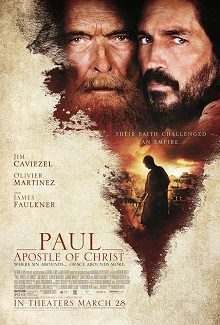 I saw this film on 4/12/18. It is about one hour and forty minutes in length. It is produced by Affirm Films, a Sony Company. It was filmed on location in Malta, an island south of Italy.
I saw this film on 4/12/18. It is about one hour and forty minutes in length. It is produced by Affirm Films, a Sony Company. It was filmed on location in Malta, an island south of Italy.
In this film, American actor Jim Caviezel plays the role of Luke. He played Jesus in Mel Gibson’s blockbuster film, “The Passion of the Christ” (2004). English actor James Faulkner plays the role of the Apostle Paul. Faulkner is a formidable looking man, perhaps over six feet tall, with a very manly, deep-pitched voice. I didn’t think he was a good choice to play Paul. I suspect that the Apostle Paul was unbecoming physically and perhaps a bit short.
The story is about the last days of the life of the Apostle Paul. He is one of the main characters in the book of Acts in the New Testament portion of the Bible. And Paul also wrote several of the letters in the New Testament. Bible scholars disagree about which of those letters Paul wrote. If all that are purported to be written by Paul are indeed his letters, as I think, they comprise 25% of the New Testament. (You sometimes hear church pastors state incorrectly that Paul wrote half of the New Testament. This can be roughly checked simply by adding pages in a New Testament.)
Before reviewing this film, some readers need background information. Besides Jesus, the two greatest figures in the New Testament who were followers of Jesus were the apostles Peter and Paul. (Apostle means “one sent out.”) Peter was the leading spokesman of the twelve apostles Jesus chose to be with him during his 2-3 years of itinerant ministry. Paul, previously surnamed Saul, came along later, after Jesus died, arose from the dead, and ascended to heaven.
Judaism consisted of two main sects: Sadducees and Pharisees. Saul was a devout Pharisee who was being trained to be a leader in Judaism. As a young Jew, he believed he was in doing God’s service by being a fierce opponent of the early Christians. But he had a dramatic conversion to Jesus, recorded in Acts 9 in the New Testament. His conversions is quite a testimony to the truth of Christianity. Even though Paul never knew Jesus in the flesh, Paul became the foremost Christian evangelist and church planter during the first century. He conducted three primary missionary campaigns throughout much of the Roman Empire.
Luke wrote two books in the New Testament: the Gospel of Luke and the book of Acts. These two documents comprise about 26% of the New Testament. Luke probably was a Gentile due to his Gentile name. Most of Acts is about Paul’s ministry as an evangelistic theologian. Luke was a physician who accompanied Paul on some of these journeys. Surprisingly, Luke ends his Acts with Paul being under house arrest in Rome with freedom to receive visitors (Acts 28.30). So, we do not know from the New Testament if Paul actually was martyred at Rome and, if so, when and how. He was tried by a court of law at Rome (Acts 24.5-6; 25.7-8; 2 Timothy 4.16). Tradition says Paul was beheaded by the state at Rome in either 67 or 68 CE.
Nero was the Roman Empire Emperor from 54 CE to 68 CE. He ruled tyrannically, committing suicide in June, 68. Before that, Rome had a great fire, in 64. Nero unjustly blamed the cause of it on Christians. Some historians say it was to divert criticism of himself for not having better fire prevention measures. Nero then began a period of time when Christians in Rome suffered persecution by the state for their faith. Many Christians at Rome then feared for their lives.
This film begins by stating that this story is located in Rome in the year 67 CE. The main story of the film is about Paul’s brief imprisonment and death at this time. It only has some flashbacks of his previous ministry, the most important being his dramatic conversion experience. I was surprised by this—that the film was not about Paul’s ministry as portrayed in the book of Acts. Some people say moviegoers are not interested anymore in historical dramas. It would have been much more expensive to make such a film in accordance with the New Testament.
The film begins with Luke learning of Paul’s imprisonment at Rome. He then travels there in search of the imprisoned apostle. This story line is fiction, meaning that it is not in the New Testament. Paul meets up with Priscilla and Aquila, a married couple. In Acts, they are indeed Paul’s friends in ministry (Acts 18.2, 18, 26). But this detail about them being in Rome is fiction.
Luke is given forged documents to use for his identity so that he may move about Rome in search of Paul. Luke finds the bald and bearded Paul in a prison cell. This union between these two dear friends—brothers in Christ and associates in ministry—is repeated often in the film as Paul moves back and forth, visiting the gathered Christians and then visiting Paul.
[Reviews of this film say it says Nero imprisoned Paul by accusing him of starting the fire in 64. If true, I must have missed that. Of course, that is fiction. However, Nero did blame the Christians for the fire; but he never singled out any particular person.]
The jailer allows Luke to spend time privately with Paul in the cell. Luke attends Paul’s wounds. Paul asks for good news. Luke says things are well with the believers in Ephesus. Paul complains that he has “made mistakes” but that “everything I have done I have done for Christ.”
Paul gets back with Aquila and Priscilla. Luke tells them Paul is nearing the end of his life. As Luke moves about the city, he sometimes encounters Christians being hung on walls and burnt to death by Roman soldiers. We are informed that this is done with Christians at “games,” also called “the circus,” in the Coliseum.
Paul is discouraged as he tells Luke, “Christ has promised us difficult times.” Luke tells Paul he could write letters encouraging the “believers.” Luke speaks of “our Lord Jesus Christ.” Paul replies, “I have never met Christ in the flesh.” Luke responds, “the day I met you I saw Christ in you.” Paul divulges, “The devil sneaks in the darkness here. Tempting me. Reminding me of this thorn in my flesh.” This refers to Paul having written, “there was given me a thorn in the flesh, a messenger of Satan to torment me—to keep me from exalting myself” (1 Corinthians 12.7). We are not told in the film what Paul meant by this “thorn in the flesh.” Christians have always speculated about what that was. The prevailing opinion among scholars is that it was poor eyesight.
One of the story lines in the film is about a military officer, a prefect named Mauritius, whose daughter becomes ill. Mauritius reveals to a friend, “Nero makes a mockery of everything I stand for.” Mauritius admits that he does not believe in the Roman gods. He asks this friend what the Christians believe.
Roman authorities learn that Luke is a Christian, so they bring him before Mauritius. [Religious practice had to be approved by the Roman Empire. Christianity was not a recognized, approved religion in the empire.] The man interacts with Luke about the Christian message.
The gathered Christian community argues about how they should respond to persecution. Luke advocates nonviolence, whereas some advocate revenge. Luke gets back with Paul, telling him about this. Paul says, “we cannot repay evil for evil.” Luke says, “Love is the only way.” Paul tells Luke he praises God for Luke’s ministry to him.
Paul then recalls his conversion on the road to Damascus. He says he was going there with official documents from Jerusalem directing him to arrest Jewish Christians. Luke asks, “You believed you were doing the will of God?” Paul admitted it. He says he was knocked to the ground. He then heard a voice that identified itself as that of “Jesus.”
The next scene is in Damascus. Paul is blinded, and his eyes are wrapped with a bandage. A man named Ananias visits him. He is a Christian unknown to Paul. He says, “I know you were sent here by the chief priests to arrest those who call on the Lord’s name.” He lays his hands upon Paul’s head, removes the bandage from his eyes, and says God has sent him to heal Paul. The apostle then regains his sight.
Paul is brought before Mauritius, with Luke accompanying him. Mauritius suggests Paul may be trying to escape. Paul replies, “Do you think I am here in Rome against my will?” This is puzzling. The obvious answer is “no,” meaning that it is Paul’s will to be imprisoned at Rome and perhaps be executed. This does not seem to comport with Paul earlier having expressed discouragement. It suggests the desire for martyrdom for which early church father Ignatius (supposedly bishop of Antioch) was famous. He got his wish by being arrested at Antioch, taken to Rome, and executed there. But such desire for martyrdom is contrary to Jesus (e.g., Matthew 26.36-42).
Aquila is informed that Christians are planning to storm a prison and free Christian prisoners there. Luke warns them sternly, “If you take up arms, you have no place in this community.” Aquila tells Priscilla, “I believe it is time for us to leave Rome.” She says she believes they have ministry there in Rome. So, they lovingly disagree.
Mauritius’ friend accuses Paul of being a sorcerer. Mauritius then gets with Paul, telling him, “the Christians look to you as their leader.” He asks Paul why Emperor Nero has imprisoned him. He then asks Paul, “This Greek,” referring to Luke, “why does he endanger his life for you?”
Mauritius tells Paul his daughter his ill. Paul replies, “Luke is a physician whose talents are unmatched.” He later tells this to Luke. Paul says, “where sin abounds, grace does abound more.”
The Roman doctor tells Mauritius that there is nothing else he can do for his daughter. He then advises him to offer sacrifices on her behalf to the Roman gods. So, Mauritius and his wife appear in a Roman temple. They have a disagreement there about Paul, the Christian. She tells Mauritius he is not being a good Roman by being sympathetic to Paul. Mauritius answers that Paul is Roman citizen. She now blames her husband for their daughter’s sickness.
Mauritius teenage daughter is now on the verge of death. So, Mauritius calls for Luke to help. Luke arrives and uses a knife to cut on the child’s body. So, Luke performs minor surgery on their daughter, which restores her to good health.
Some Christians attack the prison. They try to free Paul. Paul refuses to join them. Mauritius discovers their plot. He has them arrested as well as Luke. While in prison, Luke tells the Christians, “There will be games tomorrow.” Christian women scream. It means the Roman authorities will sacrifice Christians. Together, they pray the Lord’s Prayer.
Paul is brought before Mauritius in a garden. Mauritius informs Paul that Luke is still alive and that he helped his daughter. He says of some Christians sacrificed at the games, “I am sorry your people died today.” Paul preaches Christ to Mauritius, who tears up with emotion. Luke is now seen standing nearby, listening. Mauritius departs.
Luke speaks of “the story that began in Jerusalem thirty years ago.” Luke anticipates Paul’s death. Paul says, “to live is Christ, and to die is gain” (Philippians 1.21).
Some Christian leaders say some wealthy Romans are willing to allow Christians to escape through a dry aqueduct they own. They are sympathetic to their plight because they believe Emperor Nero is a madman and that the empire needs to be rid of him. These leaders discuss this offer, suggesting escape to Ephesus where they should be safe.
Some of the film is about Paul uttering lines drawn from his New Testament letters. Paul recalls about his life of preaching the gospel. Some of this narrative is interwoven with a fictitious plot about the persecuted Christian community at Rome being divided about whether or not to use force in resisting Roman government officials.
The Christian community plans to escape Rome via the aqueduct. Luke is with Aquila and Priscilla, who prepare to leave Rome with the Christians. Luke says he cannot leave Paul. Paul offscreen then states his gospel. The Christians depart Rome through the aqueduct.
Paul says to Luke in anticipation of the apostle’s impending death, “I have fought the good fight, I have finished the course, I have kept the faith” (2 Timothy 4.7). We then learn that Mauritius has no power to stop this execution. Paul is beheaded.
Luke then joins the Christians in the aqueduct. Surprisingly, Paul meets them. His appearance seems to be an apparition, since Paul is now dead. The film ends with the following caption: “Paul traveled over 10,000 miles for thirty years, establishing Christian communities.”
I thought it was an easy film to make. It looks low budget. It accurately portrays Christian belief, especially the teaching of the Apostle Paul as gleaned in the New Testament. I thought the film was somewhat lacking in drama. So, I would not call it a biblical epic. But I would still recommend the film to moviegoers.












